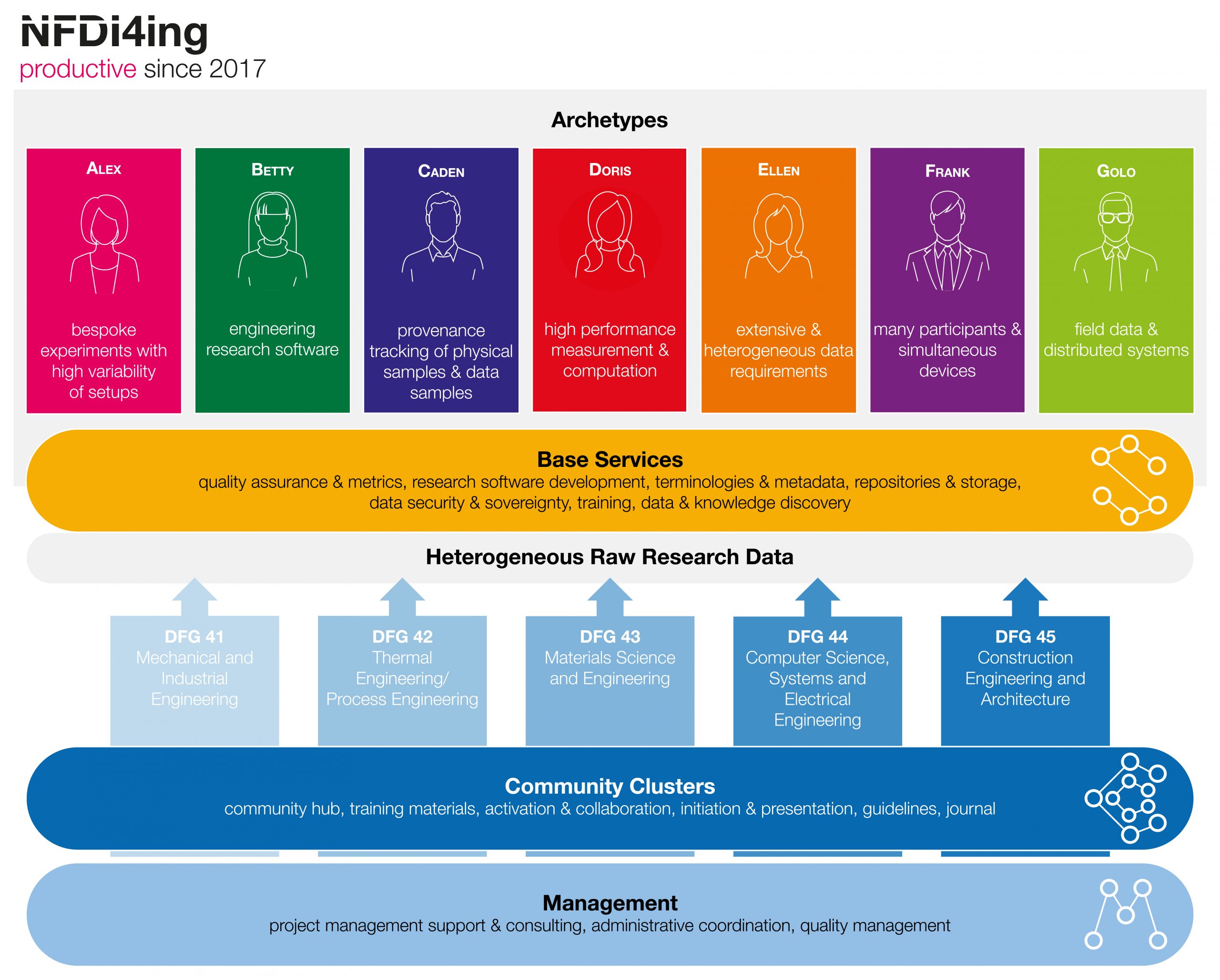NFDI4Ing
National Research Data Infrastructure for Engineering Sciences
Scientific Leader:
Project coordinator:
Project leader:
Contact person:
NFDI4Ing brings together the engineering communities and fosters the management of engineering research data. The consortium represents engineers from all walks of the profession. It offers a unique method-oriented and user-centred approach in order to make engineering research data FAIR – findable, accessible, interoperable, and re-usable.
| Duration: | 01.10.2020 till 30.09.2025 |
| Donee: | German Research Center for Artificial Intelligence GmbH |
| Sponsor: | DFG German Research Foundation |
| Grant number: | project number 442146713 |
| Partner: |
RWTH Aachen |
| Application Field: |
Agricultural Robotics
Assistance- and Rehabilitation Systems Electric Mobility Logistics, Production and Consumer SAR- & Security Robotics Underwater Robotics Space Robotics |
Project details
NFDI4Ing is one of the funded consortia of the NFDI initiative of DFG (www.dfg.de/en/research_funding/programmes/nfdi/index.html).
NFDI4Ing brings together the engineering communities and fosters the management of engineering research data. The consortium represents engineers from all walks of the profession. It offers a unique method-oriented and user-centred approach in order to make engineering research data FAIR – findable, accessible, interoperable, and re-usable.
NFDI4Ing has been founded in 2017. The consortium has actively engaged engineers across all five engineering research areas of the DFG classification. Leading figures have teamed up with experienced infrastructure providers. As one important step, NFDI4Ing has taken on the task of structuring the wealth of concrete needs in research data management. A broad consensus on typical methods and workflows in engineering research has been established: The archetypes.
So far, seven archetypes are harmonising the methodological needs:
ALEX: bespoke experiments with high variability of setups,
BETTY: engineering research software,
CADEN: provenance tracking of physical samples & data samples,
DORIS: high performance measurement & computation,
ELLEN: extensive and heterogeneous data requirements,
FRANK: many participants & simultaneous devices,
GOLO: field data & distributed systems.
A survey of the entire engineering research landscape in Germany confirms that the concept of engineering archetypes has been very well received. 95% of the research groups identify themselves with at least one of the NFDI4Ing archetypes.
NFDI4Ing plans to further coordinate its engagement along the gateways provided by the DFG classification of engineering research areas. Consequently, NFDI4Ing will support five community clusters. In addition, an overarching task area will provide seven base services to be accessed by both the community clusters and the archetype task areas. Base services address quality assurance & metrics, research software development, terminologies & metadata, repositories & storage, data security & sovereignty, training, and data & knowledge discovery. With the archetype approach, NFDI4Ing’s work programme is modular and distinctly methodoriented. With the community clusters and base services, NFDI4Ing’s work programme remains firmly user-centred and highly integrated.
NFDI4Ing has set in place an internal organisational structure that ensures viability, operational efficiency, and openness to new partners during the course of the consortium’s development. NFDI4Ing’s management team brings in the experience from two applicant institutions and from two years of actively engaging with the engineering communities. Eleven applicant institutions and over fifty participants have committed to carrying out NFDI4Ing’s work programme. Moreover, NFDI4Ing’s connectedness with consortia from nearby disciplinary fields is strong. Collaboration on cross-cutting topics is well prepared and foreseen. As a result, NFDI4Ing is ready to join the National Research Data Infrastructure.
NFDI4Ing brings together the engineering communities and fosters the management of engineering research data. The consortium represents engineers from all walks of the profession. It offers a unique method-oriented and user-centred approach in order to make engineering research data FAIR – findable, accessible, interoperable, and re-usable.
NFDI4Ing has been founded in 2017. The consortium has actively engaged engineers across all five engineering research areas of the DFG classification. Leading figures have teamed up with experienced infrastructure providers. As one important step, NFDI4Ing has taken on the task of structuring the wealth of concrete needs in research data management. A broad consensus on typical methods and workflows in engineering research has been established: The archetypes.
So far, seven archetypes are harmonising the methodological needs:
ALEX: bespoke experiments with high variability of setups,
BETTY: engineering research software,
CADEN: provenance tracking of physical samples & data samples,
DORIS: high performance measurement & computation,
ELLEN: extensive and heterogeneous data requirements,
FRANK: many participants & simultaneous devices,
GOLO: field data & distributed systems.
A survey of the entire engineering research landscape in Germany confirms that the concept of engineering archetypes has been very well received. 95% of the research groups identify themselves with at least one of the NFDI4Ing archetypes.
NFDI4Ing plans to further coordinate its engagement along the gateways provided by the DFG classification of engineering research areas. Consequently, NFDI4Ing will support five community clusters. In addition, an overarching task area will provide seven base services to be accessed by both the community clusters and the archetype task areas. Base services address quality assurance & metrics, research software development, terminologies & metadata, repositories & storage, data security & sovereignty, training, and data & knowledge discovery. With the archetype approach, NFDI4Ing’s work programme is modular and distinctly methodoriented. With the community clusters and base services, NFDI4Ing’s work programme remains firmly user-centred and highly integrated.
NFDI4Ing has set in place an internal organisational structure that ensures viability, operational efficiency, and openness to new partners during the course of the consortium’s development. NFDI4Ing’s management team brings in the experience from two applicant institutions and from two years of actively engaging with the engineering communities. Eleven applicant institutions and over fifty participants have committed to carrying out NFDI4Ing’s work programme. Moreover, NFDI4Ing’s connectedness with consortia from nearby disciplinary fields is strong. Collaboration on cross-cutting topics is well prepared and foreseen. As a result, NFDI4Ing is ready to join the National Research Data Infrastructure.
Publications
2024
Comparative Study of Soil Interaction and Driving Characteristics of Different Agricultural and Space Robots in an Agricultural Environment
In Journal of Field Robotics, Wiley, volume 41, pages 1-34, Apr/2024.
RoBivaL data corpus
Zenodo, Apr/2024.


